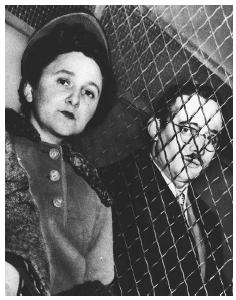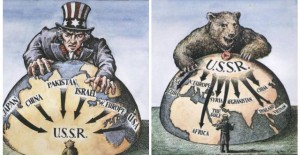In times of international crisis, the United States government often suspends domestic liberties in the name of national security. Practical sacrifices are made in response to foreign pressures. After World War II, the prevailing world system was turned upside down. The delicate balance of power in Europe collapsed leaving two superpowers, the United States and the Soviet Union. George Herring explains that “[The Cold War] resembled traditional power struggles between nation-states, but it was also a fierce ideological contest between two nations with diametrically opposed world views” (Herring 2008, 651). Those caught between these powers suffered.
Julius and Ethel Rosenberg, the young New York couple accused of Soviet espionage, are renowned for the controversy surrounding their execution. Like the Cold War period itself, the Rosenberg case was laden with ideological rhetoric and exaggeration. In his sentencing statement, the presiding Judge Kaufman explained that “[the Rosenbergs’] conduct in putting into the hands of the Russians the A-bomb years before our best scientists predicted Russia would perfect the bomb has already caused, in my opinion, the Communist aggression in Korea, with the resultant casualties exceeding 50,000 and who knows but that millions more of innocent people may pay the price of [their] treason. Indeed, by [their] betrayal [they] undoubtedly have altered the course of history to the disadvantage of our country.” The steep claim made by Judge Kaufman at the end of the Rosenberg trial reveals a desire to establish a clear narrative of history complete with villains and victims. Idealism and rhetoric dominated the Rosenberg debate on both sides.
For decades after their 1953 executions, thousands advocated that Julius and Ethel Rosenberg were innocent. Building off the reality of McCarthyism, many came to the conclusion that the death of the Rosenbergs was part of a vast F.B.I plot. Others like Judge Kaufman contested that the couple was part of a large mission to peddle atomic secrets to the Soviet Union. The prosecutor in the Rosenberg case, Irving Saypol, depicted Julius Rosenberg as part of a complex conspiracy: “Imagine a wheel. In the center of the wheel, Rosenberg, reaching out like the tentacles of an octopus.” Like the Cold War, the rhetoric and exaggerations of the Rosenberg case do little to provide any clarity.
Unlike earlier periods in American history, idealism had real and observable consequences during the Cold War. Herring explains that even “for Eisenhower, his secretary of state, John Foster Dulles, and other U.S. leaders, the Cold War was the equivalent of a holy war” (Herring 2008, 655). The Public Burning by Robert Coover satirizes the Cold War as a conflict between the demonic “Phantom” of Communism and Uncle Sam. Although a work of fiction, Coover’s novel describes the idealism that consumed and corrupted the Rosenberg case.
Julius and Ethel Rosenberg can be seen as martyrs willing to give their own lives for the sake of a cause. In The Rosenberg File: A Search for the Truth, Ronald Radosh and Joyce Milton explain that “the Rosenbergs were thoroughgoing ideologues…for Julius and Ethel everything was grist for the dialectical struggle” (Radosh, Milton 1997, 339). In her 2004 film, Heir to an Execution, the granddaughter of the Rosenbergs, Ivy Meeropol, attempts to distance her ancestors from the narrative of the Cold War. She broadens the idealism of her grandparents, arguing that: “If they were ‘spying’ I believe they were doing it out of great love for humanity. There was nothing cynical, nothing motivated by self-interest…I wish I had some of their idealism.”(Meeropol 2004). Meeropol’s revisionist perspective exaggerates the Rosenbergs deeds in the other direction, elevating them to the level of saints.
Recent developments in the Rosenberg case have complicated the conflicting ideologies surrounding the execution. Although he did deliver information to the Soviet Union, Julius Rosenberg did not dramatically “[alter] the course of history to the disadvantage of our country” as Judge Kaufman put it. In the midst of ideological uproar, the claims against the Rosenbergs had been exaggerated. Molly Hite explains that: “The electrocution of the Rosenbergs was a stunning overreaction to a purported crime–passing the ‘secret’ of the atomic bomb to the Soviet Union…could have had little effect in any case, according to such nuclear physicists as Albert Einstein and Harold Urey, who maintained that there was no secret to the atom bomb and thus nothing of importance that a spy ring, even if one existed, could have passed on to the USSR” (Hite 1993, 85). Ethel Rosenberg’s execution remains controversial as ever. She was urged to put on the image of a traditional housewife, further ammunition in an ideological case.
Like the time in which it was set, the Rosenberg case was an ideological battleground.The Cold War was a time when idealism was a reality. The truth of the case became clouded as various causes adopted the Rosenberg executions to prove one conspiracy or another. Ivy Meeropol explained that she didn’t “think they died for communism, even necessarily to make some kind of statement. It was a simple equation: they couldn’t do anything else.’’ Meeropol’s description of Julius’ and Ethel’s decision-making characterizes the Cold War era: a conflict escalated because of contrasting ideologies.
References:
Edwards, Thomas R. 1977. “Real People, Mythic History”. The New York Times: Books. http://www.nytimes.com/books/98/09/27/specials/coover-burning.html
Herring, George. 2008. From Colony to Superpower. Oxford University Press.
Hite, Molly. 1993. “‘A Parody of Martyrdom’: The Rosenbergs, Cold War Theology, and Robert Coover’s ‘The Public Burning’.” NOVEL: A Forum on Fiction. 271 (1): 85-101. Web.
Meeropol, Ivy. 2004. Heir to an Execution. Blowback Productions. DVD.
Parrish, Michael E. 1977. “Cold War Justice: The Supreme Court and the Rosenbergs.” The American Historical Review. 82 (4): 805-842. Web.
Pessen, Edward. 1984. “The Rosenberg Case Revisited: A Critical Essay on a Recent Scholarly Examination.” New York History. 65 (January): 82-102. Web.
Radosh, Ronald, and Joyce Milton. 1994. The Rosenberg File: The Search for the Truth. Delran, NJ: Gryphon Editions
Roberts, Sam. 2004. “Capturing the Rosenbergs.” The New York Times. http://www.nytimes.com/2004/06/13/movies/television-capturing-the-rosenbergs.html?src=pm&pagewanted=1



Leave a Reply